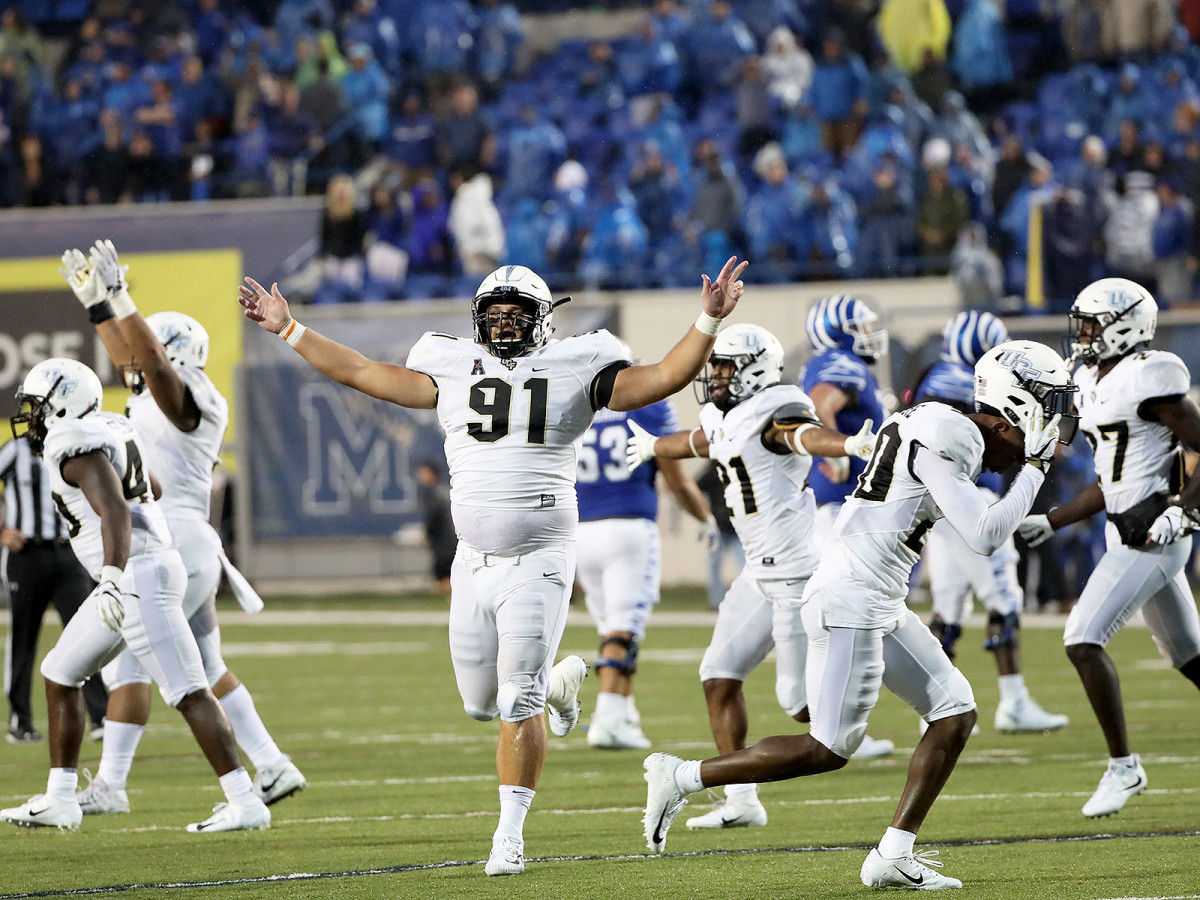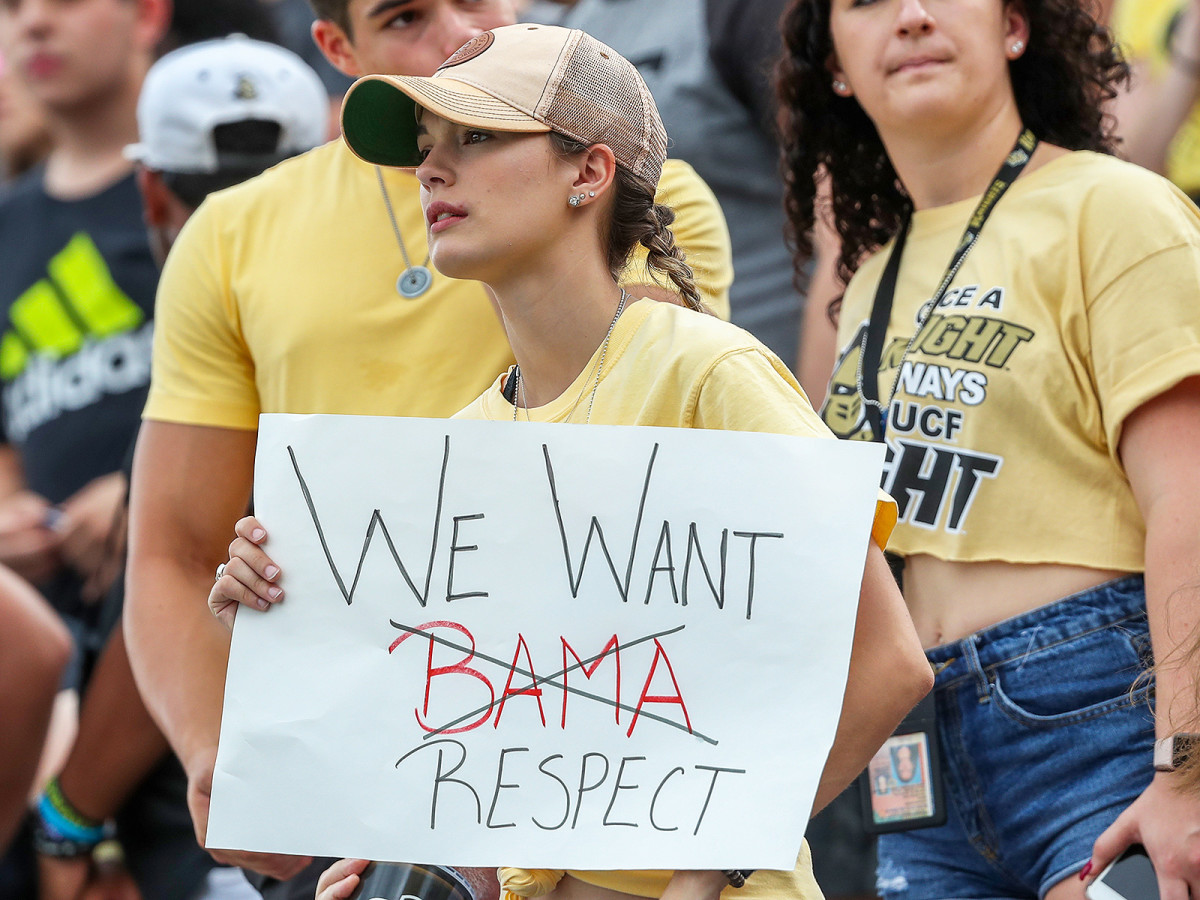Its Playoff Hopes Are Fading Again, but UCF Isn't Going Anywhere

This story appears in the Dec. 3, 2018, issue of Sports Illustrated. For more great storytelling and in-depth analysis, subscribe to the magazine—and get up to 94% off the cover price. Click here for more.
On Oct. 13, during an unseasonably chilly rainstorm in Memphis, 18 games into its now 24‑game winning streak, Central Florida trailed 30–17 at halftime and needed a jolt. The defense stiffened, refusing to yield another point. In the third quarter, coach Josh Heupel made a gutsy fourth-down call that helped cut the deficit to six. Then in the fourth, junior quarterback McKenzie Milton led a drive downfield. From seven yards out the dual-threat stalwart somersaulted into the end zone; 31–30 would do it.
Throughout the streak—the longest active one in the FBS—the Knights have known they could count on Milton, who was responsible for 45 touchdowns in 2017 and another 34 this season, even after injuries to his right ankle and right shoulder forced him to sit out an Oct. 20 game at East Carolina. After tweaking his ankle, Milton relied more on his arm, passing for 866 yards in 3 1/2 games while rushing for 103. But UCF would happily give the last five of those yards on the ground back. They came in the second quarter at South Florida on Nov. 23, and they were his final gain of 2018.
On a run to his right, Milton twisted his right knee as if his ligaments were made of Silly Putty; he underwent surgery that night. Two quarters from completing its second consecutive undefeated regular season, a week from the American Athletic Conference championship game, UCF had lost its heart and soul—but the team kept on pounding, even as any hope of a College Football Playoff berth faded. With freshman Darriel Mack Jr. under center, the No. 7 Knights routed the Bulls 38–10. “Our team is very strong-minded,” defensive back Richie Grant said that night. “We’ve been battling adversity all year, so it was just another form today. We rallied together. We knew we had to win.”
The Knights have proved they are more than just one quarterback, or one special defender, or one coach. And they’ll have a chance to show that again on Dec. 1, when they host Memphis for the AAC title. But without Milton, who finished eighth in last year’s Heisman voting, UCF is in college football’s twilight zone: perfect but flawed, undefeated but untested. The Knights can’t heal their quarterback or change their strength of schedule—which, according to Sports-Reference, ranks 98th out of 130 FBS teams—any more than they could control the weather: A game against one of their two Power 5 opponents, North Carolina, was canceled by Hurricane Florence.
All UCF can do is keep winning (average margin of victory: 23.0 points) in its bid to become the first team with back-to-back undefeated seasons since Nebraska in 1994 and ’95. Whatever the Knights’ bowl fate, they are, at the very least, a testament to wild possibility in a hidebound sport. They’re feisty. They’re distinctive. They’re also very, very good.
RAPAPORT: One Big Key to All 10 Conference Championship Games
Last winter, soon after arriving in Orlando, coach Josh Heupel—who had taken over after Scott Frost left for Nebraska—met with his players. He’d just become the third coach in the past 20 years to take over for a team that had gone undefeated the previous season, and the odds were against him; the other perfect teams that lost their coaches (Tulane in 1998 and Utah in 2004) saw win totals dip for several years after. Unfazed, Heupel asked an obvious question: What traditions did his players want to preserve from their perfect 2017 season?
Maybe the coach was hoping to learn a secret from the upstarts who, after going 0–12 as recently as 2015, had just toppled Auburn in a New Year’s Six bowl game for their 13th consecutive win. And, in fact, Heupel got an answer he hadn’t expected: cheesecake.
As they did in 2017, the Knights’ offensive linemen have continued to feast on cheesecake the night before games, then on defenses the next day: UCF has piled up 532.5 yards per game, fifth most in the FBS. Wyatt Miller, a fifth-year senior right tackle and the son of a Georgia blueberry farmer, has just one complaint about the transition to the Heupel regime: Last year’s spread offered a selection of fruit compotes to drizzle on dessert. This year, there’s just strawberry. The Miller family crop is conspicuously absent.
Until Milton’s injury, blueberries appeared to be the only thing missing for the Knights, who once again have the best program in their talent-loaded state—even if 11 teams from the more hallowed Florida schools have won national football championships since UCF took its first snap in 1979. “Blue-blood programs were built in the ’30s, ’40s and ’50s,” says Heupel. “We’re right in the midst of [that] now.”
UCF played up-tempo under Frost, but the man players call Coach Heup (pronounced hype) has upped the up to a frenzy, drawing on his experience last year coordinating Missouri’s offense, the SEC’s highest-scoring (37.5 points per game) and quickest (2.82 plays per minute of possession). An All-America quarterback who led Oklahoma to the 2000 national championship, Heupel has the Knights rattling off 2.94 plays per minute, the third-fastest rate in the FBS. Their average scoring drive covers 66.5 yards in just 2:16. “We snap the ball as soon as the refs put it down,” says junior center Jordan Johnson. “Unless we’re up by 30, and then we’ll just run the clock out.”
On defense, UCF lost talent to the NFL—cornerback Mike Hughes was a first-round pick of the Vikings; linebacker Shaquem Griffin, the 2016 AAC Defensive Player of the Year despite having just one hand, went in the fifth round to the Seahawks—but it’s still allowing an average of just 19.5 points. This year, it’s been especially effective in the red zone, where opponents have failed to score on 26.5% of their drives that have made it within the Knights’ 10-yard line. “The thing that they got much better on is not relying on man-to-man coverage and kind of spreading the stress around on the defense,” a rival AAC coach says. “That’s made them a lot more sound.”
“There’s always room for improvement,” Miller says. “Some of these younger guys that come in [and say], ‘Oh, wow, you guys went 13–0 last year, what did you do?’ Dude, it doesn’t matter what we did last year.”

In 1968, UCF opened its doors as Florida Technological University, initially serving as a support system for the Kennedy Space Center. Since 2000 it has more than doubled its enrollment to 68,571 (applications were up 11% for 2018 thanks in part to football’s success), becoming the country’s second-largest university. School president Dale Whittaker revels in standing in his office at the center of a pancake-flat campus and pointing to the library outside. “Fifty years ago,” he says, “it was just that building and this one.”
Until recently, UCF students were inclined to sport the logos of other Florida schools. Now, Gators and Seminoles have given way to a swell of Knights gear: black-and-gold tees featuring the cartoonish mascot Knightro and national-title claims, which are backed up by the computer rankings of astrophysicist Wes Colley. The Colley Matrix was included in the old BCS formula, and at the end of 2017, it ranked UCF No. 1, ahead of one-loss Alabama thanks to—oh, the irony—the Knights’ schedule. Every computer model has a different way of quantifying strength of schedule, and Colley’s looks at a team’s average opponent, essentially dinging the weak ones. Thanks to a strong year in the AAC, UCF was his darling. Colley, who was astonished at the lack of respect for the Knights last season, says, “Their résumé was plenty good enough.” (In the 2018 Colley Matrix, UCF ranks sixth.)
Around campus, last year’s final AP poll, which put the Knights at No. 6, holds little relevance. Instead, there’s a sign on the interior façade of 45,301-seat Spectrum Stadium declaring UCF national champions. On Sept. 1, a local lawyer paid for a plane to fly a banner reading UCF ’17 CO-NAT'L CHAMPS 13–0 over Alabama’s game against Louisville in downtown Orlando. (The city’s mayor, Buddy Dyer, joked that UCF should have bought out Louisville to get a crack at the Tide that night.) For those in the wrong place at the right time, there’s a campus police car emblazoned on all four doors with a similar boast: NATIONAL CHAMPIONS: THE ONLY 2017 UNDEFEATED CHAMPION.
The UCF brass has pulled out all the stops for football, from the decorated cop car to the sparkling “national championship” rings that players were awarded in April. The program’s facilities are in the middle of a $30 million upgrade, which includes refurbishing the football ops building and the student nutrition center and building a resort-caliber lazy river for athletes. For now, the Knights’ facilities, which display several glass-encased suits of armor, hardly rank with those of most Top 25 teams. “The landscape of what we have and who we’re going to be is changing quickly,” Heupel says, delivering his analysis in one gulp of sticky Florida air, speaking as fast as his team plays. “[UCF is] a unique story in college football, in my opinion, because of that.”
BRIEF: What the Preseason AP Poll Got Right and (Very) Wrong
This year’s roster includes 85 players from Florida, though none were five-star prospects. The last time UCF snared even a four-star from the state was in 2015, when Tristan Payton, now a senior receiver, spurned the Gators and the Hurricanes. Going forward, Heupel and his staff can only benefit from the falloff of the powers: Florida State will miss a bowl game for the first time since 1981, and Miami finished just .500 in ACC play.
Beating Auburn 34–27 last New Year’s Day garnered UCF a measure of credit—as did the team’s reaction, which kept it in the spotlight all winter and spring. In the leadup to the Peach Bowl, the athletic department had agreed to take a conservative line in the media: We want change in college football, with a path to the playoff for Group of Five teams. But when the confetti fell after the Knights’ victory over a team that had beaten both Alabama and Georgia—last season’s CFP finalists—AD Danny White turned to the nearest camera and uttered the three words that defined UCF’s offseason: “National champs. Undefeated.”
A week later, at a block party in downtown Orlando thrown by the city, Church Street was packed with alumni and students waving glowing cell phone screens. Chants erupted: U-C-F! We want Bama! But another refrain picked up steam: Dan-ny! Dan-ny! White, 38, who took over the program in 2015, is the perfect spokesman for UCF, young and unfiltered but still a product of the establishment: His father, Kevin, is a longtime AD who has spent the last decade at Duke. Danny knows the right things to say, with the right tone. “If we were to [go undefeated], for us to not be in consideration [for the playoff] again, I think that speaks to the credibility of the system,” he says. “And not in a positive way.”

On Nov. 11, ESPN announced that College GameDay would travel to Orlando for UCF’s lone matchup against a ranked team, No. 24 Cincinnati. It was a baptism by broadcast, but also an invasion: Many of the program’s lead voices have been, and still are, dismissive of the Knights’ playoff pleas. During an Oct. 20 telecast, ESPN’s Kirk Herbstreit said there are other Group of Five teams “as deserving or more deserving” of playoff consideration than UCF. Forget how those other teams’ seasons played out (not as well as UCF’s), what irked White was Herbstreit’s assumption of an imaginary, invisible divide between the Power 5 and the rest of the FBS. The athletics director sent a tweet, aimed at ESPN, urging it to help fix the system—and then a month later, more than 20,000 fans turned out to watch Lee Corso, in full Knightro costume, pick UCF, which won 38–13. In the background, posters demanded a playoff recount and asked, DOES THIS SIGN PASS THE EYE TEST?
Milton’s injury makes any playoff talk moot, no matter how dazzling the 6' 3", 230-pound Mack may be. As the only team that has competed at all four levels of the college game—going from Division III to D-II to the FCS to, in 1996, the FBS—it’s an unfamiliar spot for a program that has always been able to reach the next rung. UCF and its fans have cause to wonder what’s next. If they do go undefeated again, if they (when they) don’t make the playoff, then what? Another self-proclaimed title? Another year of railing against the system’s injustice? The Knights need stronger non-conference opponents, but only Dyer, Orlando’s mayor, is willing to hint at what it might take to make that happen. “I would think,” he says, “a conference that has a 12 in their name and only has 10 teams may want to consider UCF and [South Florida].”
No matter how UCF gets to the playoff (if UCF ever gets to the playoff), putting together a long-term résumé good enough to impress the committee will trail the immediate reality of this talented team—and last year’s even more elite roster—by several seasons. For now, the path to acceptance is clear: Build better facilities! That’s in the works. Bring in more top prospects! Winning begets great recruits. Schedule tougher opponents! O.K., the Knights have open dates starting in 2020 (and a marquee game against Stanford on the books for September 2019); now they need to persuade an elite team to take that non-conference risk. In other words, if UCF doesn’t want to be dismissed as a Power 5 wannabe, it will need to keep excelling into the 2020s—and get a little love from the system. “They’re not being recognized like they should be,” an opposing AAC coach says. “To promote this team like it should be promoted, it has to be done by college football.”
The Knights know they have to beat the elite teams to be taken seriously. In the meantime, they will promote themselves by playing as if they belong—because they do.
